By David Pan · Wednesday, March 16, 2022 Telos 198 (Spring 2022): Challenging State Sovereignty: Mutual Aid or Civil War? is now available for purchase in our store. Individual subscriptions to Telos are also available in both print and online formats.
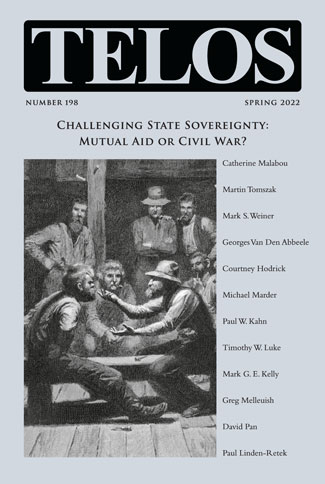 State sovereignty has a complicated relationship to individual rights. They are clearly in opposition, and both left-wing anarchist and right-wing libertarian critiques of the state have attempted to defend individual freedoms against the power of the state. Yet more traditional liberals and conservatives often see the state as the guarantor of individual rights, the left looking to the state as a provider of welfare services to the disadvantaged, and neoconservatives defending state power as the guarantor of individual rights against foreign aggressors as well as domestic enemies. These four different approaches map out a political landscape that is divided not just into left–right but also into pro- and anti-state tendencies. State sovereignty has a complicated relationship to individual rights. They are clearly in opposition, and both left-wing anarchist and right-wing libertarian critiques of the state have attempted to defend individual freedoms against the power of the state. Yet more traditional liberals and conservatives often see the state as the guarantor of individual rights, the left looking to the state as a provider of welfare services to the disadvantaged, and neoconservatives defending state power as the guarantor of individual rights against foreign aggressors as well as domestic enemies. These four different approaches map out a political landscape that is divided not just into left–right but also into pro- and anti-state tendencies.
In spite of this fragmentation, though, there are two main concerns that are shared. In the first place, there seems to be a general recognition among these different perspectives that the inhabitants of a state are not completely homogeneous and that the internal heterogeneity of a state should be at least in part the basis for domestic order. If libertarians prefer market-based structures and traditional conservatives look to family and religion, liberals seem to have gravitated toward identity-based groupings, and anarchists might prefer mutual aid organizations as independent places of sovereignty within which individuals can define themselves. The disagreements concern the type of heterogeneity that is being called for as well as the precise mechanisms for supporting diverse organizations within the state.
Continue reading →
By David Pan · Monday, September 20, 2021 Telos 196 (Fall 2021): Thinking vs. Doing is now available for purchase in our store. Individual subscriptions to Telos are also available in both print and online formats.
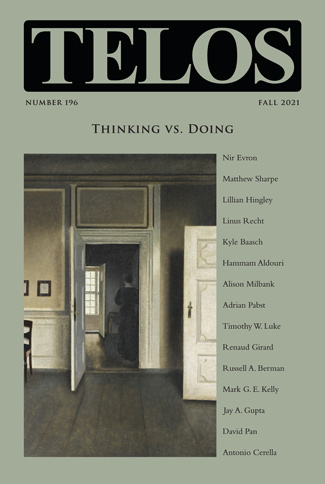 The dichotomy of thinking versus doing seems to arise out of our own sense of the difference between our minds and our bodies. On the one hand, the gap between mind and body is the basis of the perspective with which the mind can step back, criticize, and improve the world. Without this gap, we would be trapped in an eternal present, unable to imagine anything but what currently exists. On the other hand, the dichotomy can lead to a sense of detachment from the world. Such detachment can be negative if it leads to an isolation from the world, or to a sense of alienation if the world is such that its influence on the body becomes oppressive for the mind. The opposition between thinking and doing directs our attention toward this fundamental gap between the mind and the body within the human condition that is the source of both all human achievement as well as human debasement. As we focus on thinking, our detachment from our actions can allow us to make judgments about the wisdom of our actions, but such detachment can also lead us to bury ourselves in contemplation and ignore our responsibilities for acting, or even allow us to act with a kind of cruel coldness in trying to realize an abstract idea. This issue of Telos considers such different possibilities for the way in which we relate our thinking to our actions. The dichotomy of thinking versus doing seems to arise out of our own sense of the difference between our minds and our bodies. On the one hand, the gap between mind and body is the basis of the perspective with which the mind can step back, criticize, and improve the world. Without this gap, we would be trapped in an eternal present, unable to imagine anything but what currently exists. On the other hand, the dichotomy can lead to a sense of detachment from the world. Such detachment can be negative if it leads to an isolation from the world, or to a sense of alienation if the world is such that its influence on the body becomes oppressive for the mind. The opposition between thinking and doing directs our attention toward this fundamental gap between the mind and the body within the human condition that is the source of both all human achievement as well as human debasement. As we focus on thinking, our detachment from our actions can allow us to make judgments about the wisdom of our actions, but such detachment can also lead us to bury ourselves in contemplation and ignore our responsibilities for acting, or even allow us to act with a kind of cruel coldness in trying to realize an abstract idea. This issue of Telos considers such different possibilities for the way in which we relate our thinking to our actions.
Continue reading →
By David Pan · Monday, June 28, 2021 The following commentary is based on a text that appeared originally in German in Junge Freiheit. An English translation of the interview with Hans-Georg Maaßen in Die Weltwoche has been posted separately today in TelosScope, here.
The interview with Hans-Georg Maaßen documents his reactions toward the charge of anti-Semitism against him by several German media outlets in the last few weeks since he announced his candidacy for the German Bundestag. The controversy has revealed more about the deterioration of the German media landscape than about Maaßen’s own views and character. Spurred on by a charge against him of racism and anti-Semitism by climate activist Luisa Neubauer on ARD’s political talk show Anna Will, media outlets scoured Maaßen’s writings with the hope of giving their accusations some substance. The dearth of the evidence against him led them in the end to an article that he published with Johannes Eisleben in English in TelosScope. But rather than engaging with the specific arguments of the article, the commentators have engaged in a kind of witch hunt.
Continue reading →
By David Pan · Friday, June 18, 2021 Telos 195 (Summer 2021): Global Perspectives on Constitutionalism and Populism is now available for purchase in our store. Individual subscriptions to Telos are also available in both print and online formats.
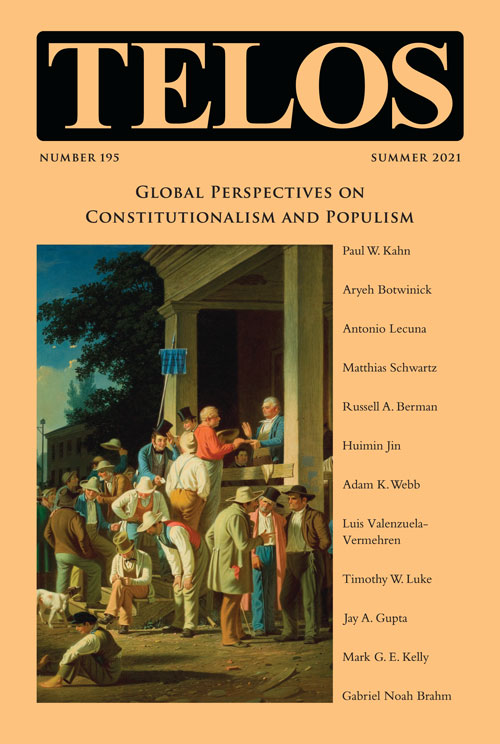 After watching the images of the January 6 Capitol riot, many Americans concluded that right-wing populism threatens the basic rules of our constitutional order. In this view, the U.S. Constitution establishes a universal order that is detached from any particular orientation and provides the neutral ground upon which differences can be discussed, while populists upset the rules of discussion and destroy the basis of a common project. Consequently, since populism is at odds with the Constitution, the solution would be to try to reimpose a measure of rationality upon the unruly. Yet the nagging concern behind this perspective is not just the violation of rules but the suspicion that populism is ultimately motivated by racism and sexism. In this case, the real opposition would not be between constitutionalism and populism but between two understandings of the Constitution, that is, two conceptions of the character of the people, one egalitarian and the other racist. The difficulty is that the laws of a constitution cannot exist independently of a people with a specific history. Rules cannot be neutral but imply a perspective on the world, and the conflict between constitutionalism and populism may in fact be a symptom of a conflict between two factions within the people, each of which is attempting to establish itself as the proper representation of the will of the people as a whole. After watching the images of the January 6 Capitol riot, many Americans concluded that right-wing populism threatens the basic rules of our constitutional order. In this view, the U.S. Constitution establishes a universal order that is detached from any particular orientation and provides the neutral ground upon which differences can be discussed, while populists upset the rules of discussion and destroy the basis of a common project. Consequently, since populism is at odds with the Constitution, the solution would be to try to reimpose a measure of rationality upon the unruly. Yet the nagging concern behind this perspective is not just the violation of rules but the suspicion that populism is ultimately motivated by racism and sexism. In this case, the real opposition would not be between constitutionalism and populism but between two understandings of the Constitution, that is, two conceptions of the character of the people, one egalitarian and the other racist. The difficulty is that the laws of a constitution cannot exist independently of a people with a specific history. Rules cannot be neutral but imply a perspective on the world, and the conflict between constitutionalism and populism may in fact be a symptom of a conflict between two factions within the people, each of which is attempting to establish itself as the proper representation of the will of the people as a whole.
Continue reading →
By David Pan · Friday, March 19, 2021 Telos 194 (Spring 2021): Political Theology Today is now available for purchase in our store. Individual subscriptions to Telos are also available in both print and online formats.
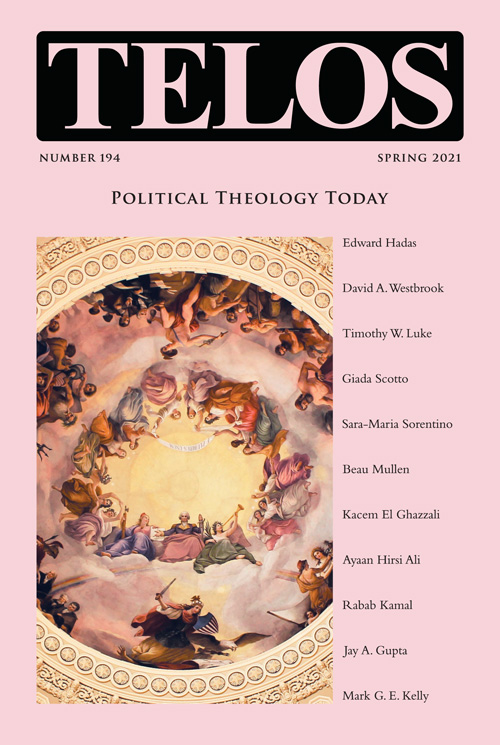 What does political theology mean today? At the Telos-Paul Piccone Institute conference from which many of the essays in this issue originated, a primary goal was to discuss the crisis of secular liberalism and “how faith is reshaping culture and politics today.” But even this project perhaps limits too much the scope of political theology, implying that we have a choice between reason and faith, or that political theology is a commitment to faith rather than an analysis of the element of faith that underlies all of our endeavors. The idea of political theology begins with the premise that every existing human order is built upon some understanding of ultimate meaning. The task would then be to analyze the kind of meaning that each existing order embodies and determine the kinds of decisions about meaning that are made and need to be made at various points in its history. Even secular liberalism, to the extent that it constitutes an existing order, presumes some answer to this question of meaning, and a closer look at the political theology of the United States reveals a mythic dimension that underlies its liberal democratic processes. The essays in this issue examine the political theological underpinnings of economy, politics, technology, and religion, laying out the ways in which these areas of human life develop not as autonomous spheres but as the result of struggles over a set of political theological choices. What does political theology mean today? At the Telos-Paul Piccone Institute conference from which many of the essays in this issue originated, a primary goal was to discuss the crisis of secular liberalism and “how faith is reshaping culture and politics today.” But even this project perhaps limits too much the scope of political theology, implying that we have a choice between reason and faith, or that political theology is a commitment to faith rather than an analysis of the element of faith that underlies all of our endeavors. The idea of political theology begins with the premise that every existing human order is built upon some understanding of ultimate meaning. The task would then be to analyze the kind of meaning that each existing order embodies and determine the kinds of decisions about meaning that are made and need to be made at various points in its history. Even secular liberalism, to the extent that it constitutes an existing order, presumes some answer to this question of meaning, and a closer look at the political theology of the United States reveals a mythic dimension that underlies its liberal democratic processes. The essays in this issue examine the political theological underpinnings of economy, politics, technology, and religion, laying out the ways in which these areas of human life develop not as autonomous spheres but as the result of struggles over a set of political theological choices.
Continue reading →
By David Pan · Friday, December 18, 2020 Telos 193 (Winter 2020): Race, Russia, and Rights is now available for purchase in our store. Individual subscriptions to Telos are also available in both print and online formats.
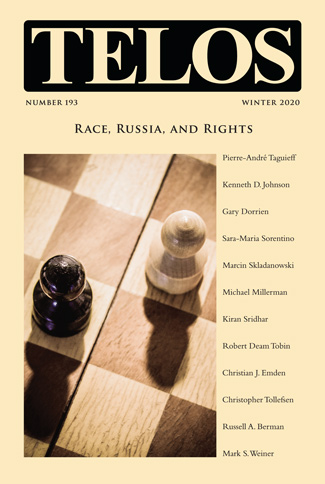 What is not up for discussion? The answer to this question defines a political order, and the repressiveness of such an order will depend on where this boundary is set between the discussable and the undiscussable. But it is not as if more discussion necessarily means less repression. Certain topics—genocide, torture, slavery—definitely need to be off the table as legitimate political measures. Other topics—the choosing of rulers and historical facts—need to be discussable in order to avoid tyranny. In between lies a gray area whose definition will establish the character of each political order. Conversely, a lack of consensus on this issue will lead to political instability that goes beyond the content of political debates, indicating that the question of discussability coincides with the problem of political identity. This issue of Telos will consider three areas in which discussability has become the main issue, leading to implacable conflict. What is not up for discussion? The answer to this question defines a political order, and the repressiveness of such an order will depend on where this boundary is set between the discussable and the undiscussable. But it is not as if more discussion necessarily means less repression. Certain topics—genocide, torture, slavery—definitely need to be off the table as legitimate political measures. Other topics—the choosing of rulers and historical facts—need to be discussable in order to avoid tyranny. In between lies a gray area whose definition will establish the character of each political order. Conversely, a lack of consensus on this issue will lead to political instability that goes beyond the content of political debates, indicating that the question of discussability coincides with the problem of political identity. This issue of Telos will consider three areas in which discussability has become the main issue, leading to implacable conflict.
Continue reading →
|
|
 State sovereignty has a complicated relationship to individual rights. They are clearly in opposition, and both left-wing anarchist and right-wing libertarian critiques of the state have attempted to defend individual freedoms against the power of the state. Yet more traditional liberals and conservatives often see the state as the guarantor of individual rights, the left looking to the state as a provider of welfare services to the disadvantaged, and neoconservatives defending state power as the guarantor of individual rights against foreign aggressors as well as domestic enemies. These four different approaches map out a political landscape that is divided not just into left–right but also into pro- and anti-state tendencies.
State sovereignty has a complicated relationship to individual rights. They are clearly in opposition, and both left-wing anarchist and right-wing libertarian critiques of the state have attempted to defend individual freedoms against the power of the state. Yet more traditional liberals and conservatives often see the state as the guarantor of individual rights, the left looking to the state as a provider of welfare services to the disadvantaged, and neoconservatives defending state power as the guarantor of individual rights against foreign aggressors as well as domestic enemies. These four different approaches map out a political landscape that is divided not just into left–right but also into pro- and anti-state tendencies. 





